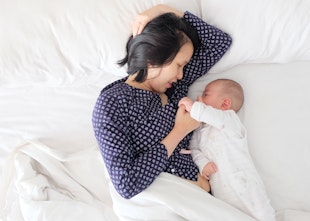If you have been researching the principles of attachment parenting you may have noticed a bit of a theme when it comes to sleep.
If you have been researching the principles of attachment parenting you may have noticed a bit of a theme when it comes to sleep. Many attachment parents reject sleep training and do not see it as a realistic option for them because it is not in line with what it means to be an attachment
parent.
This may be something that you have a couple of questions about so we hope to explain it in a little bit more detail here.
One of the main principles of attachment parenting is responding sensitively to your child’s needs. That includes the many different areas of needs that our children come with. There are a plethora of physical, emotional and social needs and as an attachment parent, we aim to respond to those needs with respect and empathy.
The problem with sleep training is that it often sees night awakenings as abnormal and a hindrance. The sleep training is pursued in order to “fix” the “problem” but in reality, a child who wakes at night is anything but abnormal or troubled. Night awakenings are extremely normal and healthy for your baby for a number of reasons.
Babies and infants have needs during the day and needs at night. If we are responding with empathy during the day and not responding at night time then we are doing our children an injustice according to attachment parents.
The truth is that most babies do not “sleep through the night” and a huge amount of pressure and intensity is placed on that topic. Many parents will admit to sleep training as a result of external influences such as comments from a close family member or friend or something from the media.
They may have been completely uncomfortable with the entire process but carried it out because it was somehow implied to them as the “right thing” to do. In fact, many people will suggest that anything other than sleep training is unfair to the child. No parent wants to do something that will negatively impact their child and so they embark on a sleep training journey to gift their child (and themselves) with “a good night’s sleep”.
When you read stories of sleep training you will see various different methods and routes that people take. Some will consider themselves to be gentle because they are “no cry” methods while others will involve horrific scenes of children hyperventilating and vomiting due to the level of upset caused.
In one story a mother talks about quickly entering her child’s room, removing the vomit-soaked bedding, changing the sheets and leaving the room without uttering a word to the baby. She did this because that is what the sleep training method suggested in this scenario. After nine days (in some cases it was less) this mother was delighted to have the result of a sleeping baby who “self-settled” but the real question is – at what cost?
The level of stress, anxiety and physical anguish that is involved in some sleep training methods make it a very traumatic experience for both babies and their parents. In many cases, one parent will be uncomfortable with the process and will, therefore, resent it completely. This causes relationship problems on top of the intense levels of stress from the training itself.
Babies require loving reassurance from their parents during the night if they wake up. The reason they are waking up may be for food, comfort or due to sickness/teething/loneliness for example. The reason will always require empathy and love from the parent. That is not to say that parents will not experience frustration throughout this. Sleep deprivation is no joke but like all things in this parenting game we must remind ourselves that “this too shall pass”.
During those times when you might be tempted to consider a sleep training technique (that goes against what feels natural for you), you might consider the research that shows a link between sleep training and physiological problems for your baby. The stress hormone cortisol can lead to long term emotional and behavioural issues.
As parents, our role is to nurture and care for our babies, even when it makes that next day quite difficult to navigate. We can help teach our children that sleep and nap time is a peaceful time but we do not have to do it through sleep training methods that feel completely unnatural and upsetting for everyone involved.
Written by Tracey, proud owner of a “non-sleeper” who now happily sleeps in his own bed and through the night.
Tracey is a happy mammy to four-year-old Billy. She is a breastfeeder, gentle parent and has recently lost five stone so healthy family eating is her passion! You can find her at www.loveofliving.ie.









